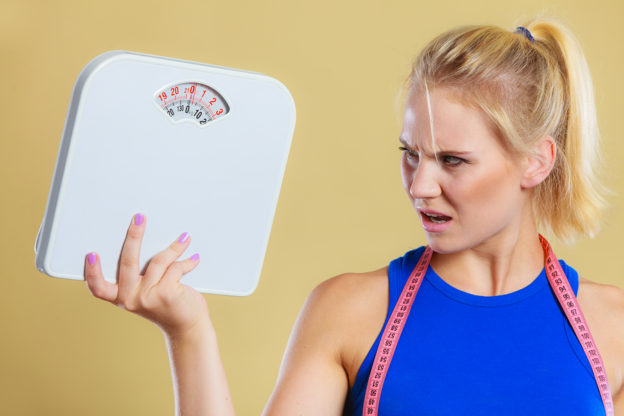By David Blyweiss, M.D., Advanced Natural Wellness
July 20, 2018
- Are these four mistakes sabotaging your weight loss goals?
- Why you might be eating the wrong “weight-loss” foods
- Sleep your way to a skinnier you
The struggle to lose weight isn’t an easy one. If it was, more than two out of every three American adults wouldn’t be overweight or obese these days.
Yes, that’s right. Just over 70% of American adults are struggling with their weight right now.
If you’re one of them, you already know the importance of getting plenty of physical activity and eating a healthy, organic, plant-based diet. However, you might not be aware of four common mistakes that could be sabotaging your weight loss efforts.
Let’s take a look.
Are You Eating the Wrong “Weight-Loss” Foods?
Open your arteries, improve blood flow for a new health miracle...
Did you know your circulatory system has over 60,000 miles of arteries, veins and other blood vessels, if stretched end to end?
But as you age, your blood vessels undergo changes, which may cause them to stiffen, thicken and get clogged.
GOOD NEWS! Doctors have now identified a “Miracle Molecule” inside your arteries that helps OPEN your arteries and IMPROVE blood flow.
It’s what Dr. Valentin Fuster calls it, "One of the most important discoveries in the history of cardiovascular medicine."To you, that means...
- Healthy blood pressure
- Sharper mind and memory
- Skyrocketing energy and muscular strength
- Increased pleasure and passion in the bedroom
- Improved circulation to every cell and organ in your body
Go here to discover a new natural way to significantly boost the levels of this miracle molecule in YOUR body NOW!
Mistake #1: Using Artificial Sweeteners. Many people who are trying to lose weight make the same mistake: They choose no and low calorie sweeteners under the belief that they will help with weight loss. I see this over and over again here at my practice.
So let me be very clear on this. Artificial sweeteners DO NOT help you lose weight. Instead, they’re actually associated with an expanding waistline and a higher risk of weight gain and obesity. To make matters worse, these sweeteners are also associated with the development of high blood pressure, diabetes, heart disease and other health issues.
If you feel the need for extra sweetness, stevia is your best choice. Unlike artificial no calorie sweeteners, stevia is a safe and natural sweetener that does not affect the way your body processes fat and energy. It also reduces after-meal glucose and insulin response – meaning it has a positive effect on your metabolism.
Mistake #2: Eating the Wrong Salads. A lot of folks who are watching their weight or trying to drop pounds eat a salad or two every day. If you’re one of them, I applaud your efforts. Under the right circumstances, a salad can make an extremely healthful meal.
But not all salads are created equal. For example, chef salads topped with deli meats, bacon, cheeses and dressing are very popular. So are buffalo chicken salads, which typically include fried chicken, buffalo sauce and bleu cheese dressing all piled together on a bed of lettuce.
Between all of the unhealthy fats, sugar, carbs and calories found in these salads, you might as well just order a sub or Buffalo wings, because none of them is going to help your weight loss efforts.
Are You Suffering From...
- Love handles and a pot belly
- Romance that isn't what it used to
- Forgetfulness and inattention
- Low (or no) strength and endurance
- A sex drive that's shifted into neutral...or worse
If so...you may have Mature Male Burnout. Click here to discover more about this unique condition and what you can do about it.
If you really want to lose weight, your best choice is a mixed green salad topped with things like avocado, tomatoes, cucumbers, sprouts, boiled eggs, carrots, peppers and nuts. You can even include a small amount freshly cooked beef, seafood or chicken. Top it off with olive oil mixed with lemon and/or vinegar for your dressing. (If you’re at home you can spice it up by and adding herbs and spices.)
Mistake #3: Avoiding Healthy Fats. One of the worst pieces of advice that you can fall for is that all fatty foods are bad for you and will pack on the pounds. It creates a situation where you end up eating healthy-sounding low-fat foods that stimulate fat storage. At the same time, you may be avoiding foods higher in fat that might actually help promote weight loss.
For example, people who eat nuts regularly have a lower body mass index (BMI), a better waist-to-hip ratio and greater weight loss than those who don’t eat them. And if they’re already normal weight, they tend to experience less weight gain over time.
Avocadoes are another food that people who are watching their weight tend to avoid. But guess what? Eating just half of an avocado with lunch can reduce your desire to eat by about 40% over the next three to five hours. This could explain why people who eat avocadoes tend to have lower body weight, BMI and waist circumference that people who don’t eat them.
And don’t forget about the power of extra virgin olive oil, wild-caught omega-3 fish and the occasional cut of grass-fed beef.
Sleep Your Way to a Skinnier You
Mistake #4: Poor Sleep Habits: While you sleep, chemicals and hormones that help control appetite are released. If you’re not sleeping soundly, those chemical messengers and hormones are disrupted, which can cause you to gain weight.
In particular, poor sleep is linked to disruptions in insulin, ghrelin and leptin metabolism. These are three of the most important hormones when it comes to your waistline and hunger levels.
However, when you overproduce these hormones, your body becomes resistant to their activity, and it becomes almost impossible to control your weight. This makes a good night’s sleep exceptionally important when it comes to reaching your weight loss goals.
If you have problems falling asleep… or staying asleep… check out this previous issue of Advanced Natural Wellness to find out what’s keeping you awake at night, and how you can address cause of your sleepless nights.
SOURCES:
Azad MB, et al. Nonnutritive sweeteners and cardiometabolic health: a systematic review and meta-analysis of randomized controlled trials and prospective cohort studies. CMAJ. 2017 Jul 17;189(28):E929-E939.
Thomas JE, et al. Stevia: It’s Not Just About Calories. The Open Obesity Journal. 2010;(2):101-109.
Jackson CL, et al. Long-term associations of nut consumption with body weight and obesity. Am J Clin Nutr. 2014 Jul;100 Suppl 1:408S-11S
Wien M, et al. “A randomized 3×3 crossover study to evaluate the effect of Hass avocado intake on post-ingestive satiety, glucose and insulin levels, and subsequent energy intake in overweight adults.” Nutr J. 2013 Nov 27;12:155.
Fulgoni III VL, et al. Avocado consumption is associated with better diet quality and nutrient intake, and lower metabolic syndrome risk in US adults: results from the National Health and Nutrition Examination Survey (NHANES) 2001–2008. Nutr J. 2013; 12: 1.
Kim TW, et al. The Impact of Sleep and Circadian Disturbance on Hormones and Metabolism. Int J Endocrinol. 2015; 2015: 591729.







